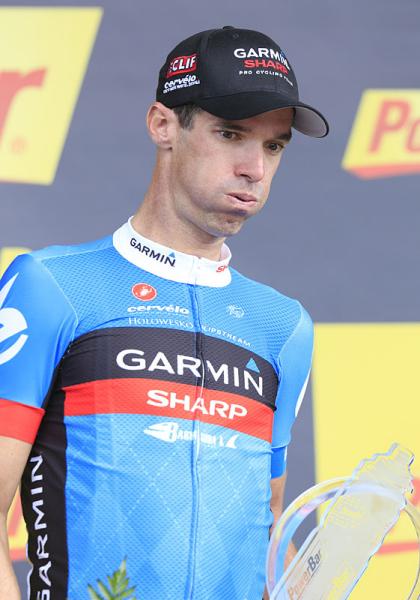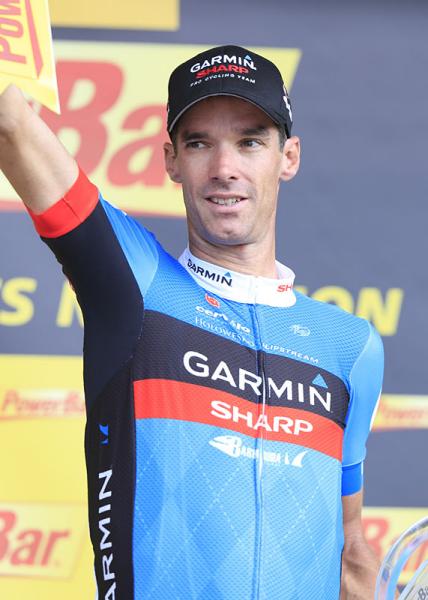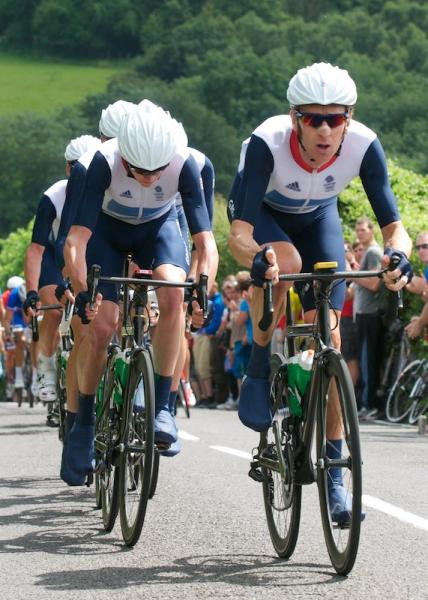Tuning into Radio Millar
"What’s going on now is a total necessity for the sport to go through"



While the fallout from the Lance Armstrong revelations continues to shed more light on an all-engulfing doping culture that existed within cycling, David Millar has remained one of the most reasoned voices to discuss both cycling’s murky past and its opportunities to move forward.
David Millar praised by Pat McQuaid ahead of Olympic Games
Millar says USADA report will change lives
Millar sees self as potentianl future UCI President
The Garmin-Sharp rider sits on a WADA commission and since his ban for doping in 2004 has been one of the most vocal anti-doping advocates in the sport. In the space of a week he has witnessed Armstrong’s legacy publicly crumble, three of his Garmin teammates confess to doping and a host of further revelations surface from the past.
Along with a call for cycling to fully address its past Millar has signalled for the UCI to come clean, teams to show a level of empathy towards riders willing to confess, and for an acknowledgement that other sports are light-years behind in the fight against doping.
“What’s going on now is a total necessity for the sport to go through,” he tells Cyclingnews.
“I think if we want to have a future, and a bright future, then it has to involve dealing with the past. I don’t think that there’s any way we can pretend that the past didn’t happen and we have to tackle it. It’s a painful experience and for a lot of guys it’s regurgitation of what we’ve managed to overcome within the sport but it’s needed.”
Millar’s book Racing Through the Dark, which tracks his career, was peppered with anecdotes of encounters with Armstrong. More often than not they were friendly, illuminating a course as Millar evolved from naïve athlete to sophisticated cheat and then into anti-doping advocate. The pair were briefly teammates but never raced together. Both signed for Cofidis for the start of the 1997 season, Armstrong on the back of Motorola folding and Millar as a talented neo-pro who had impressed Cyrille Guimard.
Cancer changed everything. Armstrong returned to the US to fight the disease and was dropped like a stone by the French team, while Millar continued as pro, basing himself in Biarritz.
Get The Leadout Newsletter
The latest race content, interviews, features, reviews and expert buying guides, direct to your inbox!
“I never got the bullying side of things,” Millar says of his relationship with Armstrong.
“I was never a threat to him and we actually got on but I always knew from guys who were in the same team as him that he would get you to do things in a race you’d never do otherwise. Maybe because you were just shit scared. His way of motivating guys was to get them so geed up and so fearful of failure that they were capable of doing things they never knew they were capable of doing.”
By the time Armstrong returned to the sport in 2009 following his first retirement, ‘Le Dandy’ – as Millar had been nicknamed during his time in France – had doped, served his ban and reformed, positioning himself at the forefront from anti-doping with his role at WADA and Garmin. The pair raced the Giro d’Italia in 2009 and had what could be described as sensitive discussions about the state of the sport. By that point, Armstrong was mocking Millar, ‘Saint David’ and ‘Radio Millar.’
“It took a while for me to pluck up the courage and go and speak to him. If Lance doesn’t like you or he’s got an axe to grind with you… generally he’ll just ignore and I’m the opposite – I have to speak to people and come to a resolution. So I spoke to him, but maybe the last time we’d talked on the phone was a couple of years before, but by 2009 and the comeback, I had taken a different path with anti-doping advocacy and not toeing the line, and when it came to Lance, he referred to me as Radio Millar. We had a ten minute clearing of the air and realised the fact that we were at different points.”
The Festina Affair
Having turned professional in 1997, Millar has been on hand through the scandals of Festina, Operacion Puerto, Oil for Drugs and the CERA positives of 2008. He has seen a number of high-profile riders, including himself, face sanctions. At the ripe age of 35, it’s perhaps a perspective that only a minority of the currently professionals have, and while the Armstrong revelations have been likened to the colossus of Festina, Millar sees substantial differences.
“I think the fundamental difference here is that with the Festina affair doping then was still very much embedded in the culture and deeply ingrained. Now the sport has changed and that’s the sad irony – the playing field has changed, and clean guys are winning the biggest races and we have the no needle policy and the majority are not doping,” he says.
“What’s happening now can offer some closure from the past and it’s going to force a certain change within the sport and hopefully at the highest level. This isn’t the Festina Affair repeating because we’ve already changed the sport and I guess now we can change the future more.”
The current climate should indeed force a number of changes, or at the very least assessments. Right or wrong, a number of approaches have been adopted: Garmin riders have acknowledged their pasts and accepted sanctions, Sky have shown intent to purge anyone with a compromised past while Patrick Lefevere’s Omega Pharma-QuickStep team have sacrificed Leipheimer.
“We’re not continually going be asked the question, ‘So Lance is clean, right?’ That made things complicated because people still wanted to believe that but you’d be at the start of the Tour de France and there would be big posters of him, and then you’d have Hein Verbruggen handing out medals at the Games, it was all so confusing because there were things that had been dealt with and changed by those actually on the ground.”
Millar’s point is that while there has been cultural shift within sections of the peloton there have been institutional elements that have slowed the progress. The focus has constantly been dialled in on the athletes but the framework and governance are just as, if not more, culpable.
“It’s not just down to the riders,” he says. “There are still huge elephants in the room and hopefully we can start to remove them one by one. It’s going to be painful and it is sad because there are young guys in the sport who don’t deserve to be dealing with this because they’ve come into the sport in the last two years and doping is such a non subject for them.”
Millar has already called for Verbruggen to step away from cycling altogether, a prospect that looks more likely every time the Dutchman opens his mouth, but Millar would like the current UCI President to cut ties with his former master too. And for all of the UCI blunders over the years, they have implemented initiatives that are worthy of praise. The biological passport, the no needle policy and educational programmes for young athletes put cycling ahead of most sports, but understandably Millar would implore McQuaid to do more, and do it now.
“He has to act like a president now and distance himself from Hein Verbruggen and the baggage that’s been fastened to him. He has to be honest about what happened. I think that the UCI were limited in what they could do but I think at the same time they need to admit to knowing how big the problem was because it was pretty obvious. They could see what was happening. That’s all we need from a president, it’s a role that should inspire confidence because this sport is the cleanest in the world.
“What cycling does is way beyond what other sports do and granted we were forced into that by the scale of the doping, but the thing is now is that we’re the flag bearers and the UCI can take credit and be proud of that, but they should also say the reason things have become good is because of the problems we had in the sport. Just admit it.”
Amnesty Fairness
And what of the theory of amnesty that has been thrown around? It’s an idealistic utopia but one the UCI and perhaps even WADA should address. Currently there is no framework and this had led to the constitutional morality differences displayed by Garmin, GreenEdge, Sky and Quickstep. It’s worth noting that the majority of teams have not moved a finger.
“The amnesty is a difficult thing. I do think that Garmin are handling it a way the sport should be. By being honest and taking the bans they have and still working with the team but being honest. The bottom line is that otherwise it will never stop and people are just going to get fired. And they can’t fire everyone.”
“We have to find a solution but I don’t think firing everyone and showing zero tolerance works,” Millar says in relation to the stances taken by Sky and Lefevere.
“I think we need a bit more empathy and understanding into what happened. People do need to be punished but I think what we’re doing with our team is the right solution. Why would you now come forward if you’re going to get fired? We have to now say you may have a punishment and you may lose your salary during your ban but it all has to mitigated by the fact you came forward.
“That’s the biggest challenge the sport now faces and it’s up to the UCI to try and come up with an across the board solution. There has to be a form of punishment but it doesn’t have to be a career ending one. We’re coming to terms with the fact that the sport was messed.”
Daniel Benson was the Editor in Chief at Cyclingnews.com between 2008 and 2022. Based in the UK, he joined the Cyclingnews team in 2008 as the site's first UK-based Managing Editor. In that time, he reported on over a dozen editions of the Tour de France, several World Championships, the Tour Down Under, Spring Classics, and the London 2012 Olympic Games. With the help of the excellent editorial team, he ran the coverage on Cyclingnews and has interviewed leading figures in the sport including UCI Presidents and Tour de France winners.
